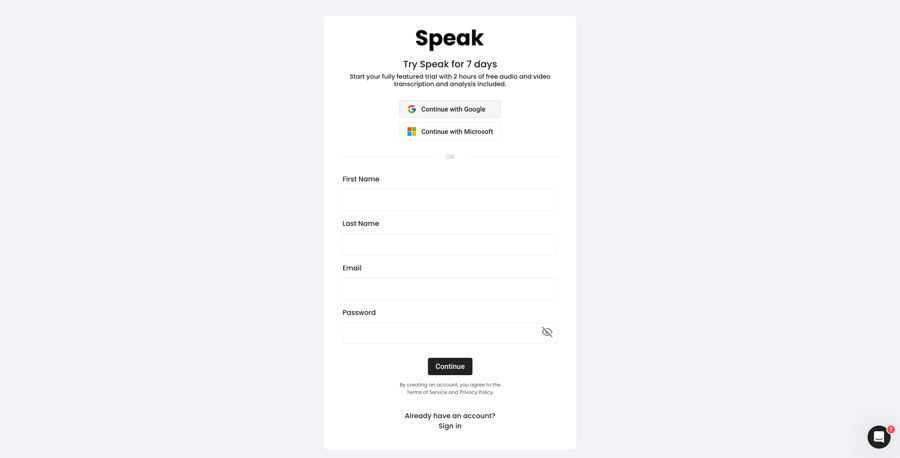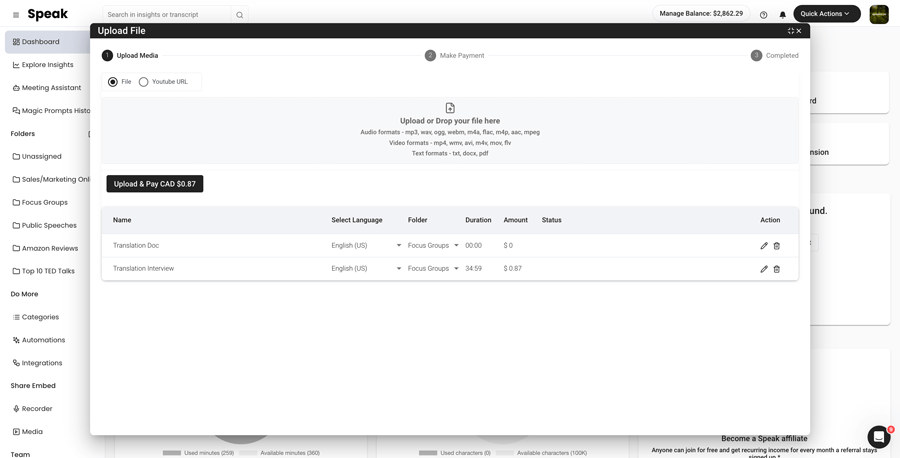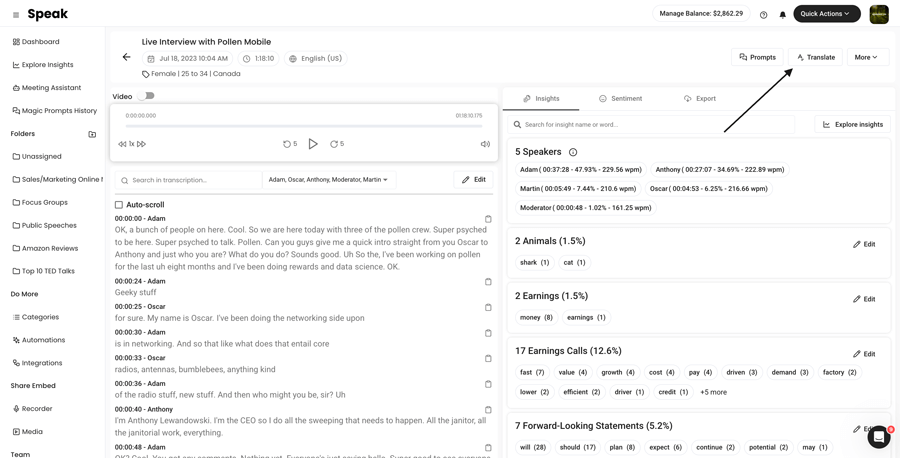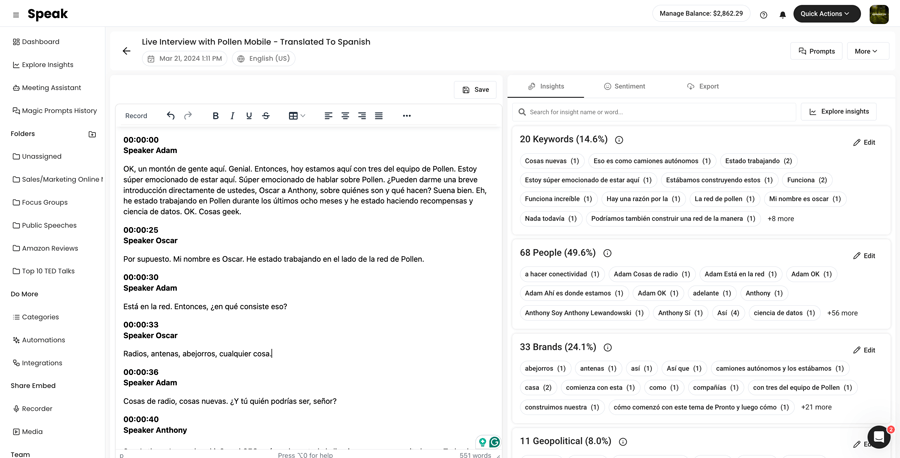How To Translate German to Luxembourgish
Translating German to Luxembourgish is super simple!

Step 1: Register for Speak
Register for Speak using this link.
Once you register, you can instantly begin translating your German to Luxembourgish file(s).

Step 2: Upload Your German file(s)
As soon as you log in, you will be redirected to the dashboard.
Once there, you can select the Quick Action "New Upload".
In Speak, you can seamlessly upload, transcribe and translate audio, video and text files all at once!

Step 3: Translate Your German file(s) to Luxembourgish
Once the file is uploaded, simply visit your file and select "Translate".
If it is an audio and video file, Speak will ask you if you want to keep the speaker names and timestamps in the translation.
Want to translate many files at once? No problem!
You can view the files you want to automatically translate from German to Luxembourgish from the folder level and instantly translate as many files as you need with our artificial intelligence translation in just a few clicks.

Step 4: That's It! View, Analyze, Modify & Export Your New Luxembourgish file(s)
Once the translation is done, you will be alerted and you will see a new document in the same folder your original file is in.
The file will be named the same but with a dash indicating that it is the translated version.
Need support with your German translation?
We are always here and happy to help at Speak!
Just send us a message on live chat on the bottom right corner and we will ensure you are set up for success.
Interested in translating German or other languages to different languages? View our entire list of supported translation languages here.
Automatic, accurate, instant AI translation from German to Luxembourgish is here for you.
Register for Speak using this link and begin translating German to Luxembourgish today.
Unlocking New Opportunities: Translate German to Luxembourgish with AI
With the rise of globalization, the need for seamless communication across different languages has never been more critical. Specifically, in the heart of Europe, the translation between German and Luxembourgish opens a door to a multitude of opportunities, especially for researchers and businesses aiming to expand their reach. Speak AI leverages cutting-edge NLP, generative AI, and automatic translation to provide an unparalleled service that not only bridges the language gap but also drives efficiency and growth.
The Significance of German and Luxembourgish Translation in Today’s World
In an era where digital transformation dictates the pace of business, the ability to communicate clearly and effectively in multiple languages is a competitive advantage. Translating between German and Luxembourgish is particularly significant due to the unique position these languages hold in Europe. Speak AI's translation tools are designed to support this by offering accurate, fast, and nuanced translations that respect the complexities of both languages.
How Speak AI Is Revolutionizing Translation
Speak AI stands at the forefront of the translation revolution with its AI Meeting Assistant and NLP capabilities, designed to cater to the specific needs of translating audio, video, and textual content from German to Luxembourgish. This is not just about translating words but capturing the essence of communication, making it a powerful tool for anyone looking to operate in or with Luxembourg and Germany.
Enhanced Efficiency and Cost Savings
The integration of advanced AI technologies means that Speak AI can offer translations at a speed and cost that traditional methods cannot match. This efficiency transcends financial savings, translating to a valuable resource for meeting tight deadlines and scaling operations across language barriers.
Accuracy and Nuance in Translation
Accuracy in translation goes beyond mere words to include context, cultural nuance, and the subtleties of language. Speak AI’s NLP and large language models are trained to understand these intricacies, ensuring translations that are not only accurate but also culturally relevant and appropriate.
Applications Across Industries
The potential applications of German to Luxembourgish translations extend across various sectors, including academic research, legal, healthcare, marketing, and customer service. Speak AI is especially beneficial for entities involved in cross-border operations, providing them with the tools needed to communicate effectively and comply with local regulations.
The Value Proposition of Speak AI for German to Luxembourgish Translations
Speak AI is not just a translation service; it's a comprehensive communication solution that empathizes with the linguistic diversity of the European region. With a 4.9 rating on G2 and a user base of over 150K, Speak AI’s platform has been recognized for its exceptional capability to facilitate not just translations but overall communication strategies.
The Evolution and Impact of AI in Translation
AI translation has significantly evolved, and Speak AI is at the cutting edge of this evolution. Offering automatic translation with real-time data analysis, Speak AI transforms how businesses and researchers engage with their multilingual audiences, driving both sign-ups and revenue growth through enhanced communication strategies.
Aligning with Global Business and Research Needs
Whether it's for expanding research findings to a new audience or reaching customers in their native language, the automatic translation from German to Luxembourgish provided by Speak AI is an indispensable asset for global engagement.
Driving User Engagement and Satisfaction
By eliminating language barriers, Speak AI ensures that businesses and researchers can connect with their audience on a deeper level, enhancing user engagement and satisfaction. This ability to communicate effortlessly in the audience's native language is a game-changer in the global marketplace.
Promoting Cultural Understanding and Inclusion
Beyond facilitating communication, the accurate and nuanced translations by Speak AI promote greater understanding and cultural inclusion, paving the way for more inclusive and nuanced interactions between German-speaking and Luxembourgish-speaking communities.
The Increasing Relevance of German and Luxembourgish Translations
The landscape of international communication is ever-changing, with German and Luxembourgish holding strategic positions in European communication networks. Speak AI’s translation tools not only keep pace with this evolution but actively drive progress, empowering users with the ability to transcend language barriers efficiently and effectively.
Locations Where German and Luxembourgish Are Popular
German is one of the most spoken languages in Europe, serving as an official language in Germany, Austria, Switzerland, and parts of Belgium. Luxembourgish, while primarily spoken in Luxembourg, also has speakers in Belgium, France, and Germany. Together, these languages form an essential part of European cultural and economic exchange.
Interesting Stats on Countries, Populations, and History
Germany is home to over 83 million people, with a vast majority speaking German. Luxembourg, though significantly smaller, has a population where Luxembourgish, French, and German are all official languages, embodying the country's multilingual and multicultural ethos.
Fun Facts About German and Luxembourgish
Despite its small size, Luxembourg plays a vital role in European politics, being one of the founding members of the European Union. German, on the other hand, is known for its long words and complex grammar, distinguishing it from the simpler syntax of Luxembourgish.
Differences and Similarities Between German and Luxembourgish
While both languages share Germanic roots, Luxembourgish has evolved to incorporate many French loanwords, setting it apart from High German. However, their close origins mean that speakers of both languages can often find common ground, making the translation between them a fascinating linguistic bridge.
In conclusion, the translation from German to Luxembourgish, powered by Speak AI’s advanced technology, is not just about converting text from one language to another; it's about opening doors to new opportunities, understanding, and collaborations. Speak AI is dedicated to enhancing this journey, providing tools that not only translate but also unite.
Translate German To These Other Supported Languages:
- Translate German-to-Afrikaans
- Translate German-to-Albanian
- Translate German-to-Amharic
- Translate German-to-Arabic (Egypt)
- Translate German-to-Arabic (Iraq)
- Translate German-to-Arabic (Israel)
- Translate German-to-Arabic (Jordan)
- Translate German-to-Arabic (Kuwait)
- Translate German-to-Arabic (Lebanon)
- Translate German-to-Arabic (Oman)
- Translate German-to-Arabic (Palestinian Authority)
- Translate German-to-Arabic (Qatar)
- Translate German-to-Arabic (Saudi Arabia)
- Translate German-to-Arabic (Syrian Arab Republic)
- Translate German-to-Arabic (United Arab Emirates)
- Translate German-to-Arabic Modern Standard (Bahrain)
- Translate German-to-Armenian
- Translate German-to-Assamese
- Translate German-to-Aymara
- Translate German-to-Azerbaijani
- Translate German-to-Bambara
- Translate German-to-Basque
- Translate German-to-Belarusian
- Translate German-to-Bengali
- Translate German-to-Bhojpuri
- Translate German-to-Bosnian
- Translate German-to-Bulgarian
- Translate German-to-Catalan
- Translate German-to-Cebuano
- Translate German-to-Chinese (Simplified)
- Translate German-to-Chinese (Traditional)
- Translate German-to-Corsican
- Translate German-to-Croatian
- Translate German-to-Czech
- Translate German-to-Danish
- Translate German-to-Dari
- Translate German-to-Dhivehi
- Translate German-to-Dogri
- Translate German-to-Dutch
- Translate German-to-English
- Translate German-to-English (Australia)
- Translate German-to-English (Indian)
- Translate German-to-English (Irish)
- Translate German-to-English (New Zealand)
- Translate German-to-English (Scottish)
- Translate German-to-English (South African)
- Translate German-to-English (United Kingdom)
- Translate German-to-English (United States)
- Translate German-to-Esperanto
- Translate German-to-Estonian
- Translate German-to-Ewe
- Translate German-to-Farsi (Persian)
- Translate German-to-Filipino Tagalog
- Translate German-to-Finnish
- Translate German-to-French
- Translate German-to-French (Canada)
- Translate German-to-Frisian
- Translate German-to-Galician
- Translate German-to-Georgian
- Translate German-to-German
- Translate German-to-German (Swiss)
- Translate German-to-Greek
- Translate German-to-Guarani
- Translate German-to-Gujarati
- Translate German-to-Haitian Creole
- Translate German-to-Hausa
- Translate German-to-Hawaiian
- Translate German-to-Hebrew
- Translate German-to-Hindi
- Translate German-to-Hmong
- Translate German-to-Hungarian
- Translate German-to-Icelandic
- Translate German-to-Igbo
- Translate German-to-Ilocano
- Translate German-to-Indonesian
- Translate German-to-Irish
- Translate German-to-Italian
- Translate German-to-Japanese
- Translate German-to-Javanese
- Translate German-to-Kannada
- Translate German-to-Kazakh
- Translate German-to-Khmer
- Translate German-to-Kinyarwanda
- Translate German-to-Konkani
- Translate German-to-Korean
- Translate German-to-Krio
- Translate German-to-Kurdish
- Translate German-to-Kurdish (Sorani)
- Translate German-to-Kyrgyz
- Translate German-to-Lao
- Translate German-to-Latin
- Translate German-to-Latvian
- Translate German-to-Lingala
- Translate German-to-Lithuanian
- Translate German-to-Luganda
- Translate German-to-Luxembourgish
- Translate German-to-Macedonian
- Translate German-to-Maithili
- Translate German-to-Malagasy
- Translate German-to-Malay
- Translate German-to-Malayalam
- Translate German-to-Maltese
- Translate German-to-Maori
- Translate German-to-Marathi
- Translate German-to-Meiteilon (Manipuri)
- Translate German-to-Mizo
- Translate German-to-Mongolian
- Translate German-to-Myanmar (Burmese)
- Translate German-to-Nepali
- Translate German-to-Norwegian
- Translate German-to-Nyanja (Chichewa)
- Translate German-to-Odia (Oriya)
- Translate German-to-Oromo
- Translate German-to-Pashto
- Translate German-to-Persian
- Translate German-to-Polish
- Translate German-to-Portuguese
- Translate German-to-Portuguese (Brazilian)
- Translate German-to-Portuguese (Portugal)
- Translate German-to-Punjabi
- Translate German-to-Quechua
- Translate German-to-Romanian
- Translate German-to-Russian
- Translate German-to-Samoan
- Translate German-to-Sanskrit
- Translate German-to-Scots Gaelic
- Translate German-to-Sepedi
- Translate German-to-Serbian
- Translate German-to-Sesotho
- Translate German-to-Shona
- Translate German-to-Sindhi
- Translate German-to-Sinhala
- Translate German-to-Sinhala (Sinhalese)
- Translate German-to-Slovak
- Translate German-to-Slovenian
- Translate German-to-Somali
- Translate German-to-Spanish
- Translate German-to-Spanish (Mexico)
- Translate German-to-Sundanese
- Translate German-to-Swahili
- Translate German-to-Swedish
- Translate German-to-Tajik
- Translate German-to-Tamil
- Translate German-to-Tatar
- Translate German-to-Telugu
- Translate German-to-Thai
- Translate German-to-Tigrinya
- Translate German-to-Tsonga
- Translate German-to-Turkish
- Translate German-to-Turkmen
- Translate German-to-Twi (Akan)
- Translate German-to-Ukrainian
- Translate German-to-Urdu
- Translate German-to-Uyghur
- Translate German-to-Uzbek
- Translate German-to-Vietnamese
- Translate German-to-Welsh
- Translate German-to-Xhosa
- Translate German-to-Yiddish
- Translate German-to-Yoruba
- Translate German-to-Zulu



